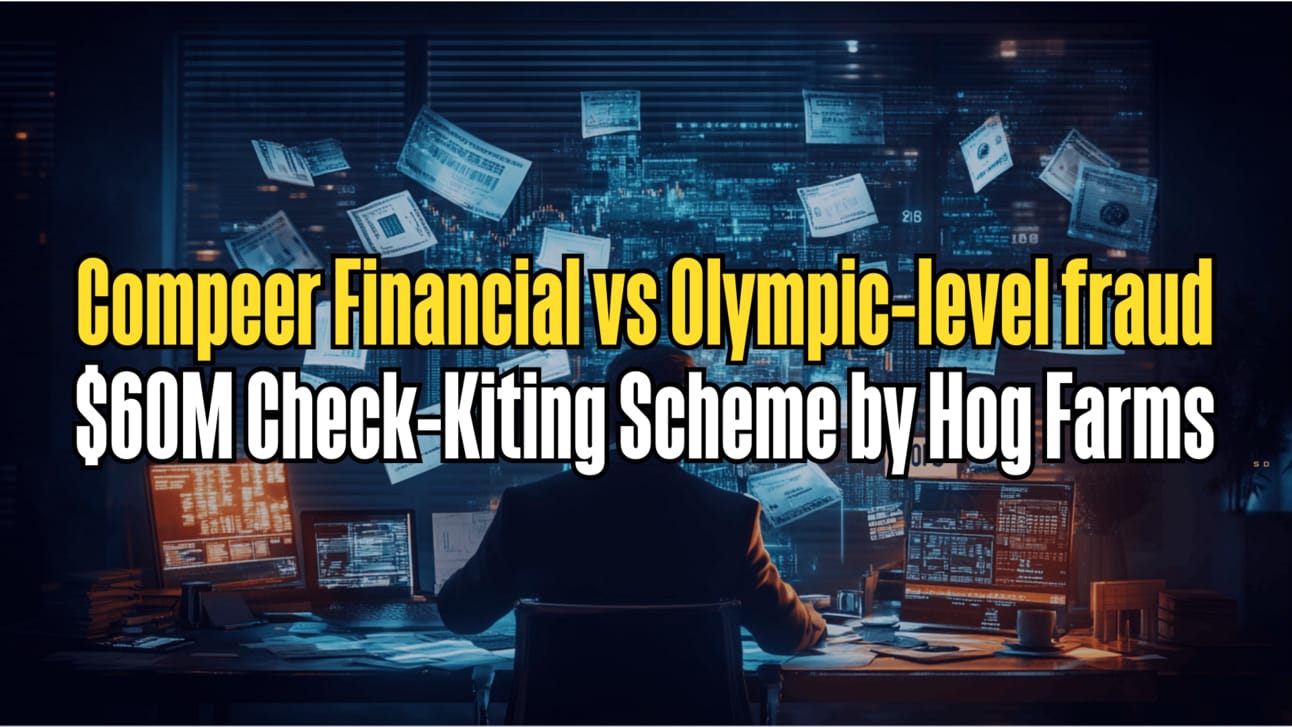
A sophisticated check-kiting scheme involving three South Dakota hog farms has left Compeer Financial, a member-owned Farm Credit cooperative, facing losses of approximately $36 million. The case highlights significant vulnerabilities in cross-border financial monitoring and the challenges of secured agricultural lending.
Compeer Financial filed a lawsuit in South Dakota District Court against Sunwold Farms, Sunterra Farms, and Lariagra Farms, alleging they engaged in a massive check-kiting operation that created artificial account balances by continuously writing checks between accounts at different banks without sufficient funds. The scheme involved:
Daily transfers of nearly identical amounts between Compeer and Canadian Western Bank (CWB)
Approximately 18 checks totaling $16.6 million moving between accounts each day
Individual checks strategically kept between $800,000 and $990,000, just below regulatory scrutiny thresholds
Total fraudulent transfers amounting to billions of dollars over several months8
The scheme collapsed in February 2025 when Compeer stopped honoring checks, revealing that the Canadian Western Bank accounts were overdrawn by approximately $21 million.
Subsequently, CWB dishonored 65 checks totaling $59.9 million that had previously been credited by Compeer, instantly transforming the defendants' $21 million positive cash balance into a $36 million debt.
Cross-Border Banking Vulnerabilities
The case exposes significant weaknesses in monitoring cross-border transactions between U.S. and Canadian financial institutions:
The scheme exploited the time delays in check processing between international banks1
Regulatory barriers prevented direct communication between Compeer and CWB, with Sunterra refusing to authorize information sharing between the banks
Secured Agricultural Lending Challenges
The case highlights the unique risks associated with agricultural lending against livestock collateral:
The three farms had pledged approximately 110,000 hogs as collateral for an $11.5 million loan from Compeer
When the fraud was discovered, Compeer faced the immediate challenge of ensuring the animals' continued care to preserve collateral value
The specialized nature of the collateral (live animals requiring ongoing care) created urgent concerns about asset preservation
Receivership and Bankruptcy
On March 28, 2025, U.S. District Court Judge Eric Schulte appointed Pipestone Management II as receiver to:
Take control of the three companies' operations
Ensure the continued care of approximately 110,000 pigs
Investigate financial transactions and preserve evidence
The court determined all three swine operations were insolvent or in "imminent danger" of insolvency. On April 11, 2025, Sunterra Enterprises Inc. and many of its subsidiaries filed notices under the Bankruptcy and Insolvency Act, with total liabilities reported at approximately $140 million.
Broader Implications
This case demonstrates that even sophisticated financial institutions with established risk management practices remain vulnerable to fraud schemes. It also illustrates how secured lending structures can still result in substantial losses when collateral requires ongoing maintenance and care, as is common in agricultural settings.
The appointment of a receiver represents an extreme but necessary measure to preserve asset value in this distressed situation, with Compeer continuing to fund animal care despite the fraud to protect its collateral interest.
Our Opinion
This situation really highlights why traditional agricultural lenders are struggling to keep up with the times. Compeer's decision to continue funding animal care even after discovering fraud shows they weren't ready for the possibility of a default.
It's expected that borrowers might default, and plans must be made accordingly.
While appointing a receiver was necessary, a more agile lender would have had backup plans from the start.
One of the most revealing aspects is how they avoided regulatory scrutiny by keeping checks just under $990,000. An algorithm could have spotted that pattern instantly.
This is precisely why tech-savvy alternative lenders are outperforming traditional ones. Their systems would catch these issues right away, while Compeer seemed unaware until they were $36 million in the hole.
1-Minute Video: Automated Judicial & Contractor License Checks by Cobalt API
Cobalt's API can provide instant check of judicial records and contractor licensing
Manual verification processes are becoming competitively unsustainable.
Cobalt Intelligence offers a solution that both reduces risk and increases funding speed - giving alternative lenders both safety and competitive advantage in their market.
Subscribe to our Beyond Banks Podcast Channels
Headlines You Don’t Want to Miss
Banking-as-a-service startup Solid, which had positioned itself as the "AWS of fintech" and raised nearly $81 million in funding, filed for Chapter 11 bankruptcy protection on April 7, 2025, after failing to raise additional capital since its last funding round in 2022 and facing significant legal disputes. The company, now down to just three employees, is attempting to restructure or sell itself through the bankruptcy process while continuing to operate its business in the ordinary course.
Capital Southwest Corporation (Nasdaq: CSWC) has expanded its senior secured credit facility by $25 million, increasing total commitments to $510 million from the previous $485 million. The expansion, announced on April 9, 2025, was executed through the existing accordion feature with two current lenders from the 11-participant lender group providing the additional funding, strengthening the internally managed business development company's capacity to provide flexible financing solutions to middle market businesses.
Blackstone Secured Lending Fund (NYSE: BXSL) announced it will release its first quarter 2025 financial results on May 7, 2025, before market open, followed by an investor conference call via public webcast at 9:30 a.m. ET the same day. The specialty finance company, which invests primarily in the debt of private U.S. companies with approximately $13.1 billion in investments as of December 31, 2024, previously declared a Q1 2025 dividend of $0.77 per share payable on April 25, 2025, to shareholders of record as of March 31, 2025.
Schedule a FREE Demo Call with Jordan
Get Free Access to our Alternative Finance Disclosure Law Helper GPT
Get Free Access to our Cobalt Modern Underwriter GPT
Get Free Access to our Alternative Funding Expert GPT
Get Free Access to our AI Credit Risk Tool
Create an account to Get Free Access to our Secretary of State AI Tool

Subscribe on our YouTube Channel here
See us on LinkedIn


